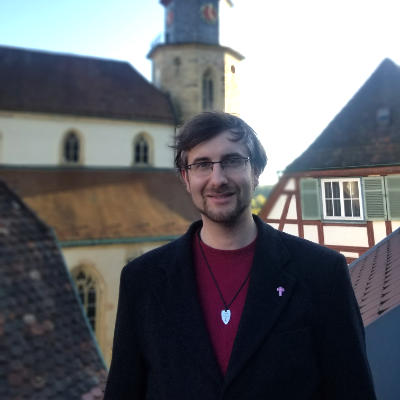
My name is Benedikt Jetter.
Right on the ‘Forum Young Theology’ conference in Sibiu in 2023, I turned 34. My ecclesiastical background is the Evangelical-Lutheran Church in Württemberg (Germany), where I’m serving as pastor in the region of Stuttgart. Born in the year of the fall of the Berlin wall, I feel European in the broadest and most positive sense. Still, in the last years, I have the impression, that crossing borders and linking people from differing historical, emotional and confessional contexts, is not as obvious as it might seem. There’s still a lot of relations to establish. From my civil service in France with the organization ‘Initiative Christians for Europe’, I adopted the motto ‘building bridges for Europe’. Almost everything I do, is somehow related to that, always in the perspective of the One Church of Jesus Christ transcending time & space and all human borders. Europe has become for me a fascinating ‘training area’ (referring to ‘train’ both as exercising and using the railway). Through studies abroad internships, steward programmes, conferences and work stays in different churches, I got acquainted with broad parts of the ecumenical family, where I feel spiritually at home.
What I take home
In dialogue, I often say: “We do not have the truth in our hands; but I trust that the one truth holds us in her hands”. On the conference, I learned something similar about hope: “We do not hold on hope; hope holds on us” As hope has been presented as signature of Christian existence, so also participation: participation is to be seen as direct result of creation. Creation sets in a relationship and to creator creates humans as co-creators, which involves both pleasure and responsibility. Put in this way, participation is not just a nice add-on, but essential for each human being and, surely, for every church communion. Standing on sustainable theological ground, which should not be despised precipitately, in my opinion, the traditional European churches do have much more potential to enfold.
To contribute to that, I continue sharing in the life of partner churches and staying in contact with friends and colleagues from the various backgrounds. With passion, I got involved in CPCE, LWF, the Gustav-Adolf-Werk (GAW), the German Waldensian Association (DWV) and others. From so-called ‘small’ churches, which often are great in engagement, humbleness, and joyfully stubborn hope, I learn a lot, e.g. that all churches – by theological definition – live in diaspora in the sense that, if minority or majority, we as church(es) all are sent together into this world with all its differing society to be salt and light. Not because we’re better, but because we accept God’s sending mission to confidently continue in hope and the spirit of the Easter laughter.
Where I want to take responsibility in future
Surely, everything contributing to participation, is close to my heart. On a local level as well as on a broader global scale. As those levels, nowadays, are not to be separated, we need to think and act much more ‘glocally’ – which for me is just another word for ecumenically.
The other motto of my civil service was ‘working for peace’. To build bridges for the future, in the last years even before the current war, I’m more in volved in dialogue with ‘eastern’ Churches, both Protestant, Eastern Catholic and Orthodox. Often, hard work, persistent patience and a long wind are needed. In spite of all the usefulness of knowledge about historical and other backgrounds, at the end, it is the language of the heart which opens the doors to other people’s souls. For me, this language springs from the faith in the common creator of all co-creatures. And from this fundamental, universal and global language spring, in my case, other concrete local languages. Wherever you show towards the other that you’re interested in her/him, arises the experience of being appreciated.
While aiming to deepen understanding of other languages and to compile a multilingual translation dictionary for church, theology, ecumenism, Bible, faith and religion, I have started to learn Russian. As Russian is (for conflicting reasons) a widespread Slavonic language, I hope it will open the door to a third of Europe – and hopefully even to some human heart. It might seem naive, but I’m convinced that learning a language (even/specially Russian) can be a contribution to future peace in Europe. On the one hand, I’m fully aware that I’m an individual person which alone will not be able change the world; on the other hand, I’m fully aware that God sends each of us individually to participate in responsibility all together in order to change the world. If we as creatures created in the image of God support one another in unfolding our god-given co-creative talents and in contributing to a common higher goal, there’s a lot of participatory potential to be set free.